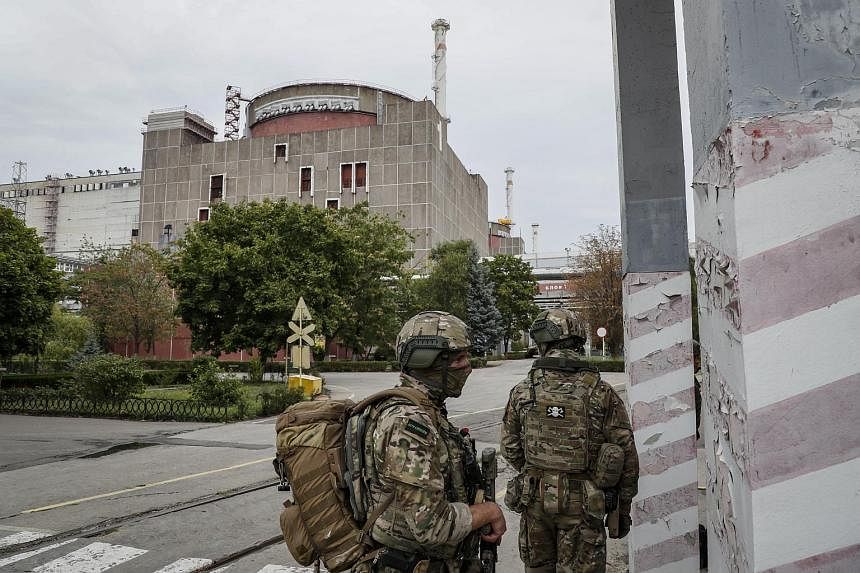MOSCOW - After unleashing a wave of repression to crush opposition to his war in Ukraine, President Vladimir Putin is moving to shape attitudes among young Russians with a programme of patriotic education in schools.
Teachers nationwide are being ordered by the education ministry to deliver a special lecture on Sept 12 titled "Our Country - Russia" that quotes Mr Putin's justification for what he calls the "special military operation" in Ukraine.
It argues that Russia invaded to protect its security and stop the North Atlantic Treaty Organisation (Nato) military alliance from establishing bases in Ukraine.
Mr Putin told school students at a televised meeting on Thursday to mark the new academic year that young people should be told why Russian soldiers are fighting and in many cases dying in Ukraine since he ordered the Feb 24 invasion.
Nato had no timeframe to accept Ukraine as a member, and the government in Kyiv had no plans to host Nato bases.
Much of the world rejects Russia's defence of the war that has caused thousands of deaths, sent millions fleeing from their homes and inflicted huge destruction on Ukrainian towns and cities.
Russian troops have been accused of war crimes, while Ukrainian resistance aided by supplies of US and European weapons dashed Kremlin hopes for a swift victory.
Tens of thousands of Russian troops have been killed or wounded, according to estimates by the US and its allies.
The intervention in schools comes as recent opinion polls by the independent Levada Centre show young Russians are less enthusiastic about the war than older groups and that they rely far less on state TV for information, preferring social media where there's a much wider range of sources and views beyond the Kremlin's control.
The war lecture is part of a new weekly programme starting on Monday that aims to cultivate patriotic and traditional values in schools, where teachers have also been ordered to play the Russian national anthem and raise the flag at the start of each week's classes.
Officials have authorised only one textbook in every subject to underline the government's message, with the war in Ukraine mentioned in history manuals.
The Kremlin has also founded a national patriotic youth organisation reminiscent of the Communist-era Pioneers and Komsomol organisations that officials say will count 18 million schoolchildren as members.
After his meeting in Kaliningrad with the school students, many of whom were activists in state-approved youth groups, Mr Putin joined them in singing the national anthem.
"The idea is to instill ideology into young and susceptible minds of children," said Ms Ekaterina Schulmann, a Russian political scientist critical of the Kremlin and a fellow at Germany's Robert Bosch Academy.
"If it lasts for 10 years, it can help to raise a generation that even if they don't enthusiastically uphold these values will at least consider them the way the world is run."
The lecture on the war in Ukraine violates Russia's Constitution, which forbids propaganda in schools, an independent teachers' trade union set up by jailed opposition leader Alexey Navalny said in an open letter.
A growing number of teachers who publicly question the invasion are facing administrative penalties under a law passed in March that makes it a crime to discredit the Russian military, according to the OVD-Info monitoring group.
The campaign to foster patriotism in children about the war comes as Ukrainian forces are mounting a counteroffensive in the country's south aimed at retaking territory occupied by Russian troops.
After failing to take the Ukrainian capital, Kyiv, early in the invasion, Russian forces are attempting to seize the eastern Luhansk and Donetsk regions as well as much of southern Ukraine, though the campaign has stalled in recent weeks.
In occupied areas of Ukraine, officials have imposed a Russian curriculum in schools and replaced Ukrainian textbooks.
Schools will "work in a single education space with Russia," Education Minister Sergey Kravtsov told Mr Putin at a July 8 meeting.
Senior officials including Foreign Minister Sergei Lavrov, the deputy head of the Kremlin administration Sergei Kiriyenko and Mr Putin's spokesman Dmitry Peskov took turns this week to drive home the patriotic message in speeches to students at the "Knowledge" forum in Moscow, a Soviet-era educational organisation that Mr Putin revived in 2016.
Mr Peskov urged his young audience to read Mr Putin's 2007 speech to the Munich Security Conference, in which he warned Russian patience over Nato's eastward expansion was running out, whenever they had a question about Russia's actions in Ukraine. Nato had no timeframe to accept Ukraine as a member, and the government in Kyiv hadn't pledged no plans to host NATO bases. Since the invasion, Finland and Sweden, neutral throughout most of the Cold War, have sought to join the military alliance. BLOOMBERG

